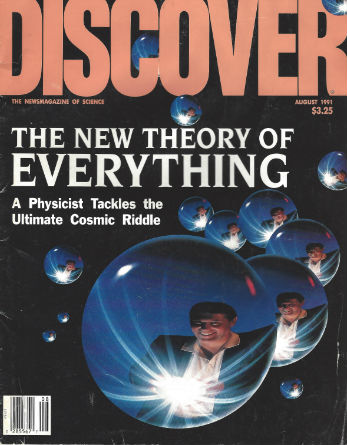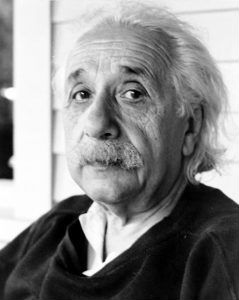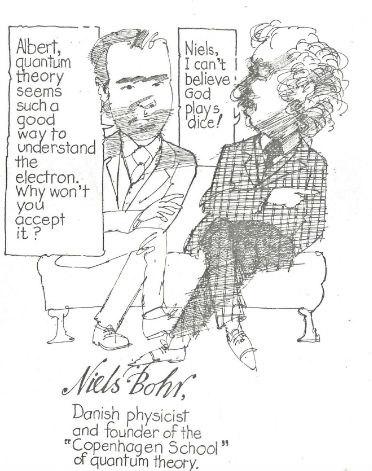Pondering The Biggest Mystery in the Universe?
By Neil Earle
 The 1990s saw a renewed search for the Grand Unified Theory but as C.S. Lewis intimated, the complexity of the cosmos is so overwhelming that it is hard to find one material or natural mechanism behind it all.
The 1990s saw a renewed search for the Grand Unified Theory but as C.S. Lewis intimated, the complexity of the cosmos is so overwhelming that it is hard to find one material or natural mechanism behind it all.What it it?
According to the Smithsonian magazine it is the question: what is the source of the “dark energy” that makes up 73% of the universe? (Some put it at 68%). Dark energy itself can only be defined as a theoretical possibility. It seems to be a repulsive force that counteracts gravity since it is now established that the universe is expanding at an accelerating rate and thus bucking the supposed constraints of the law of gravity.
In the late 1990s scientists confirmed that planets, stars, galaxies and all the objects we know of, represents only 4-5% of the matter in the universe. Thus the discussion of “dark matter” entered the lexicon from that time. What is it? Supposedly a non-luminous material created by etiher the interaction of subatomic particles in space or their random motions through the cosmos.
The Quandary for Gravity
These explanations seem tentative and they are.
The problem is, says science writer Richard Panek, that our Milky Way doesn’t have enough mass to keep everything together according to the rules of attraction inherent in gravity. As the galaxy spins it should disintegrate, throwing out stars and gas in every direction. But no. The whole thing somehow holds together. Hence the mystery: Either our galaxy violates the laws of gravity – and gravity has been the foundation of the last 400 years of science – or something else lurks behind the stars and gas clouds, something we cannot see or measure.
Most call it “dark matter” but even astronomer Michael Turner, who pressed forward to postulate “dark energy,” didn’t know how to define these terms. “We have a complete inventory of the universe,” says cosmologist Sean Carroll at Caltech, “and it makes no sense.”
Once again, as at the beginning of the 20th century and the work of Planck, Einstein and Bohr, the universe is proving a much stranger place than we thought. The paradox now is that “our capacity to see, blinds us to what is there.” What makes up the hidden fabric of the universe? As Panek says: We are asking a most elementary question – What is this cosmos we call home?
 Albert Einstein
Albert EinsteinA Time for Humility?
Humility would seem to be in order. Panek is a biographer of Albert Einstein, the most famed physicist of the 20th Century. The famed cosmologist spoke with much more humility on the universe in front of us than some science writers today. How often we see noised about on the nightly news or in the press the short-sighted, breathless headline such as “‘Universe Has No Purpose,’ says Leading Scientist” and the old Science/Religion bun fight in on once again.
Remember that Einstein had pioneered by implication our world of Big Bangs, black holes, wormholes, quarks, photons and other sub-atomic particles but he recognized that his theories of the very large (time and space or SpaceTime) didn’t mesh well with Plancks and Bohr’s probings inside the atom and the new quantum physics.
By 1925 it was clear that quantum activity in the atom, supposedly the stable core of everything, was not predictable to a precise point. At first, Einstein did not like this deviation from orderliness. He argued with Bohr that “God does not play dice with the universe.” But with the continued erosion of the older “clockwork” physics of the 1700s and 1800s, Einstein saw that there was room to postulate a “super causality” behind things that perhaps pointed to an Intelligence towering above even what he knew. Hence Einsein’s pet name for God, “the Old One.”
It seems from some of his comments that in his mind Science and Religion did not have to live in watertight compartments. In the 1930s in The World as I See It, he wrote: “The harmony of natural law reveals an Intelligence of such superiority that, compared with it, all the thinking and acting of human beings is an utterly insignificant reflection.”
A Swiss biographer reported: “Einstein used to speak of God so often that I almost looked upon him as a disguised theologian.”
The God Who Hides
The orderly universe which Einstein believed came from God’s hand required much study to yield up its secrets. His early Catholic education perhaps exposed him to the God of Isaiah and such challenging texts as Isaiah 45:15, “Truly, you are a God who hides himself.” Proverbs 25:2 balances this out with “It is the glory of God to conceal a matter; to search out a matter is the glory of kings.” As an awe-filled seeker after God’s thoughts Einstein “marveled at the mysterious comprehensibility of the universe which is yet finally beyond his grasp,” claimed theologian Tom Torrance.
In the era of dark energy and dark matter it is intriguing to see how both the Bible and our greatest physicists are admitting that Nature’s hidden order cannot be logically derived from surface study alone. “I am trying to think God’s thoughts after him,” Isaac Newton once remarked. He knew God had not given us his flow charts. To this Einstein added, “[S]cience can only be created by those who are thoroughly imbued with the aspiration towards truth and understanding. This source of feeling, however, springs from the sphere of religion” (Science, Philosophy, and Religion, 1941).
So there it is. There are scientists astute enough – and humble enough – to testify that Science and Religion need each other. Though Einstein, for example, did not see God as a personal Presence in the evangelical Christian sense, he knew enough to declare in 1939: “Science without Religion is lame; Religion without Science is blind.”
 Bohr's quantum discoveries of unpredictable movements inside the atom (quantum leaps) seemed to Einstein to suspend the laws of Cause and Effect.
Bohr's quantum discoveries of unpredictable movements inside the atom (quantum leaps) seemed to Einstein to suspend the laws of Cause and Effect.Religious Roots of Science
Religion’s excesses are all too obvious in the age of 9/11 and religious fanaticism. But science too has a hard time controlling the fruits of its technological horn of plenty. There are heart transplants and Fukushimas, miracle babies and horrendous oil spills. Lame science and blind religion are not the path to the decipherng the Cosmos. Even Einstein gave up on the GUT (Grand Theory of Everything).
Why is this so? Walter R. Thorson, a scientific theologian, explained: “The practicing faith of a scientist is a faith ultimately in the order, consistency, intelligibility to man of the creation in which we find ourselves, [not] faith in man but in a dependable Creator.” Einstein said something similar in his answer to a young girl’s question if scientists ever prayed:
“Scientific research is based on the idea that everything that takes place is determined by laws of nature…However, it must be admitted that our knowledge of these laws is only imperfect and fragmentary.” There is the humility principle again. He added that “the belief in the existence of basic all-embracing laws of nature also rests on a sort of faith…[E]veryone who is seriously involved in the pursuit of science becomes convinced that a spirit is manifest in the laws of the universe, a spirit vastly superior to that of man” (Torrance, page 26).
Some have called Einstein a “worshipful non-believer.” In the face of the complicated precision of the universe he concluded that “the pursuit of science leads to a religious feeling of a special sort.”
Of course, this forced a question for Christians and believers in God. Where was God at the Big Bang? Bible believers knew he was at the beginning but when was that and how did it happen? What was the impetus?
Since no human being was there at the beginning, everything we know about Origins has to be either a) an educated guess or b) a reconstruction based on the best evidence we have.
Is there room in some of these reconstructions for a new regard and respect for the Old One? Do theries of dark matter and dark energy lend indirect confirmation of the ancient Christian reflection in Colossians 1:17 that “He (God) is before all things, and in him all things hold together.” Or that of Hebrews 11:3, “the world is not made out of things which do appear.”
Or are we rushing the story. Many have taken up the quest for the GUT, the Grand Theory of Everything. But as long as it eludes us we have to at least be open to fresh insights from a book that claims to be inspired by the One who says he knows the end from the beginning (Isaiah 46:10).